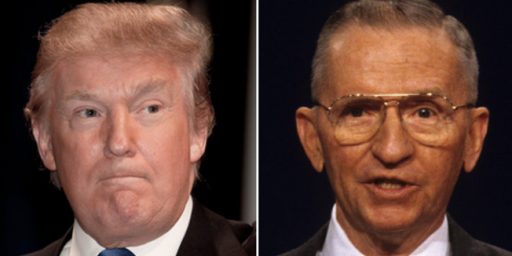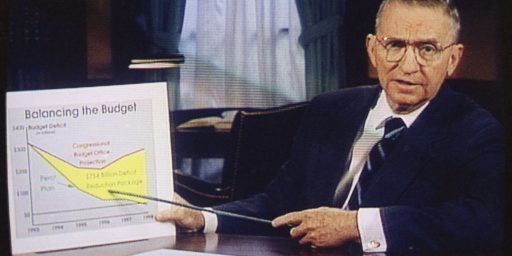Bloomberg Mulls 2008 Presidential Bid — As Independent
New York City mayor Michael Bloomberg has been seriously exploring an run for the presidency as a third party candidate. A long cover feature in New York Magazine outlines a “withering indictment of the political class, Democrats and Republicans alike, slamming its members for pandering, myopia, and borderline corruption” that author John Heilemann correctly notes “echoes unmistakably the Texan twang of H. Ross Perot.” Still,
Perot was manifestly unhinged; Bloomberg, by all indications, is sane. And Bloomberg has none of Perot’s isolationist or nativist leanings. But in other ways, their similarities are striking: both arch-capitalists, self-made men, technocrats, moralists; both possessed of a belief that government ought to be run more like a business; both allergic to the cant and dogma inherent in professional politics.
He’s also planning a strategy very much like Perot used in 1992:
Whether that happens will likely depend on two factors: who the two parties pick as their standard-bearers and the mood of the country. Bush’s longtime media guru, Mark McKinnon, who now advises McCain, contends that “if a year from now there hasn’t been much progress or bipartisanship, and if the primaries do what they often do and squeeze out the moderates, you’ll have an ideal situation for a third-party run.” Sheekey, in fact, has publicly laid out the most likely Bloomberg-friendly scenario: McCain is beaten by someone to his right (Mitt Romney, say) and the Democrats choose someone generally seen as unelectable (guess who?).
[…]
Sheekey’s game plan for 2008 begins with the premise that the mayor can afford to wait until early that year to jump. And afford is the proper term, for mounting a tenable independent campaign would likely cost $250 million to $500 million. For most fantasy-league candidates, raising that kind of dough would take years, if not decades. For Bloomberg, it would take, figuratively speaking, a trip to the ATM. (“Half a billion dollars?” he said to someone at a party this year. “Not a problem.”)
Waiting until early 2008 would be necessary, of course, to get a bead on who the Democrats and Republicans were inclined to nominate. But delaying is desirable for other reasons, too. “In any third-party effort, you want to start late,” says McKinnon. “You gotta catch lightning in a bottle, not let yourself get stale. If Perot had waited to start his campaign until after his daughter’s wedding, he would probably have been president.”
Perot’s implosion, to be sure, was largely self-inflicted. But it was also a result of Bill Clinton’s maneuvers to co-opt his issues—talking up the deficit, in particular—before the 1992 Democratic convention. “If the major-party candidates have time to move in on your turf,” says Al From, “then you get squeezed and there’s not a lot you can do.”
The biggest downside to starting late is that it makes it harder to get on the ballot in all 50 states. But here the putative Bloomberg campaign has been blessed by fate with a ready-made solution: Unity08, a grassroots outfit in Washington that intends to field a centrist presidential ticket (selected via an online convention in June 2008) and handle the ballot-access hassles. Though the group may sound a little sketchy, two of its prime movers are Doug Bailey, the Republican consultant who nearly engineered an upset win for Gerald Ford in 1976, and Hamilton Jordan, Jimmy Carter’s White House chief of staff. Sheekey, it turns out, has already met with Jordan. And Bailey is openly courting the mayor. “It’s in both our interests for him to seek the Unity08 nomination,” he says, audibly salivating.
Being a billionaire, no doubt, has its advantages. Still, the odds are more than just a little long. No candidate has won the presidency from a third party since Abraham Lincoln did it in 1860 and that took the stars aligning themselves perfectly. And, as some may recall, that “perfect” alignment was the precursor to civil war.
Winning the presidency requires amassing 270 electoral college votes which are, with the minor exceptions of Maine and Nebraska, awarded winner-take-all by the 50 states and the District of Columbia. Even with the worst imaginable major party nominees, it is unfathomable that Bloomberg could do that. If no candidate got the requisite 270, the election would then be thrown to the House of Representatives where those with major party affiliations would obviously have a rather decided advantage.
Further complicating the math is that Bloomberg’s strategy seems to be based on Hillary Clinton as the Democratic nominee. If that happens, it’s unclear to me that he can even pick off New York, his home state, given her popularity there as a senator. Indeed, the most likely outcome in that match would be for the Republican to win a plurality of the three-way vote and thus collect all of the Empire State’s votes.
Hat tip: Political Wire





Third party candidacy is much less about winning than it is about denying. While Hillary would likely beat Bloomberg, would Vislak beat Bloomberg for NY? Maybe, maybe not. And if the democratic candidate lost the 31 EV to a third party candidate, is there a reasonable way for them to make it up?
The more I look at it, the more I see 2008 being shaped by a third party candidate. What I can’t see is which party is most likely to be denied the presidency due to a third party candidate.
Clinton won both of his elections with less than 50% of the vote. Carter only got 50.08%. A third party candidate doesn’t have to take very many votes to tilt the election.
Just in time to save the rest of America from second-hand smoke and trans fats.
I am not sure why he doesn’t run as a Republican? Sure, the Jesus freaks would hate him, but he certainly is more poised than McCain and would likely win the nomination easily.
Any Democrat wouldn’t have a chance against him in the general election.